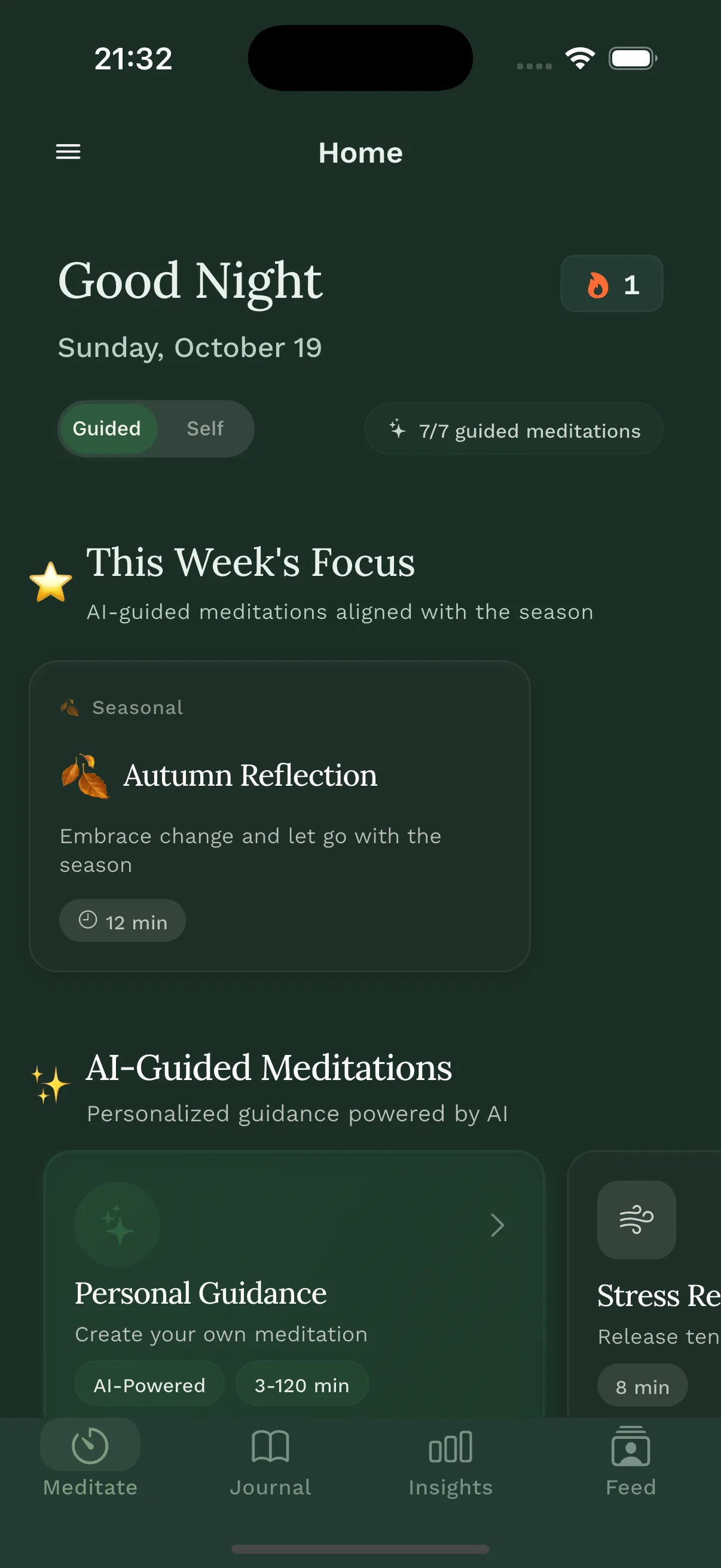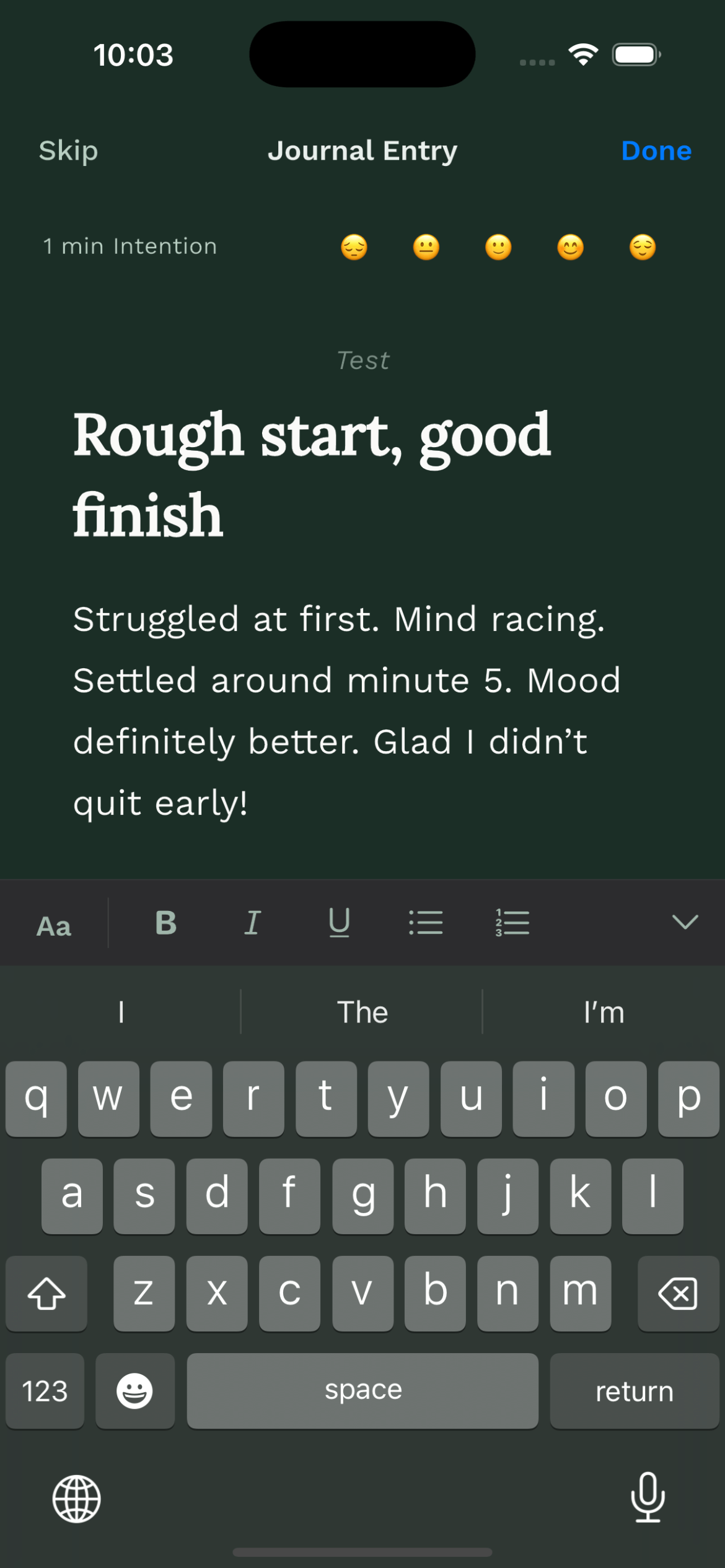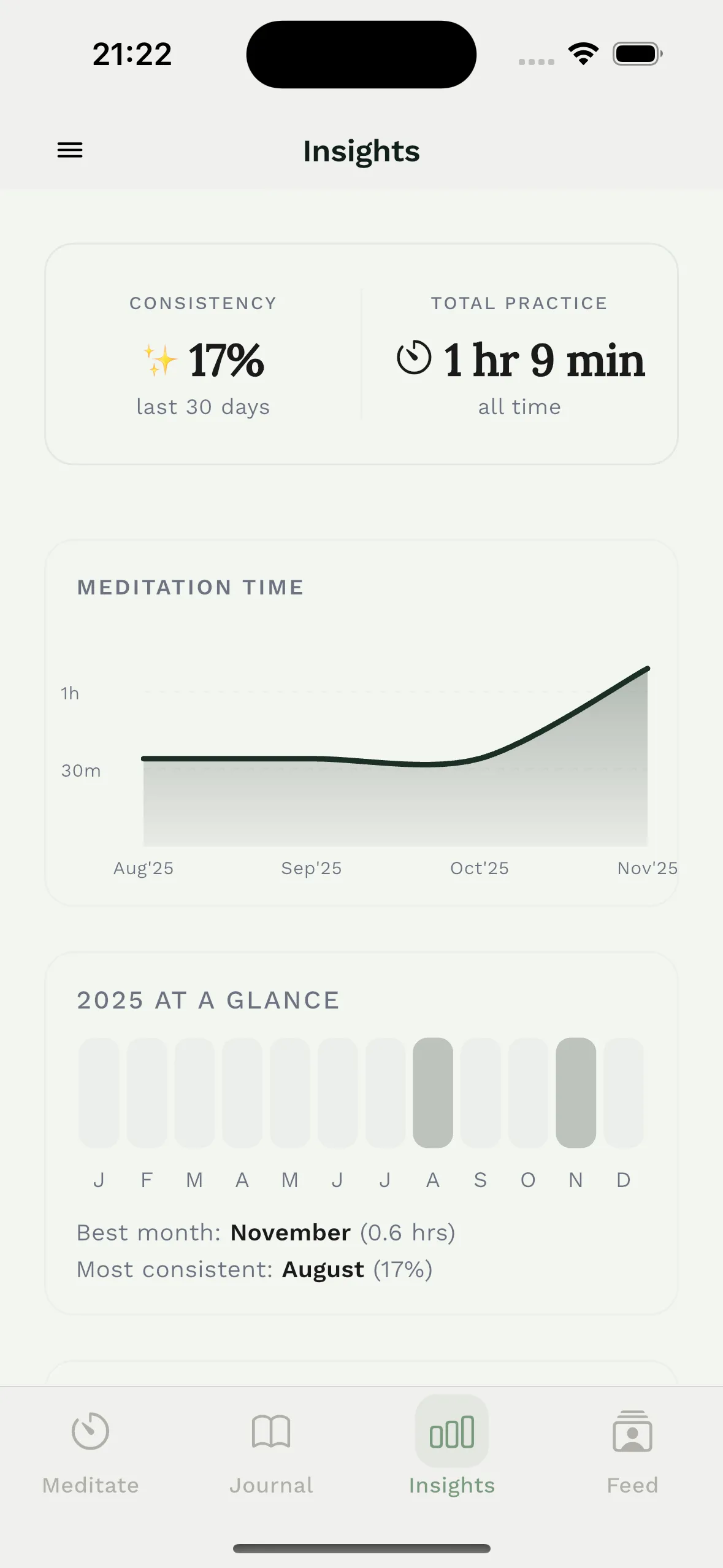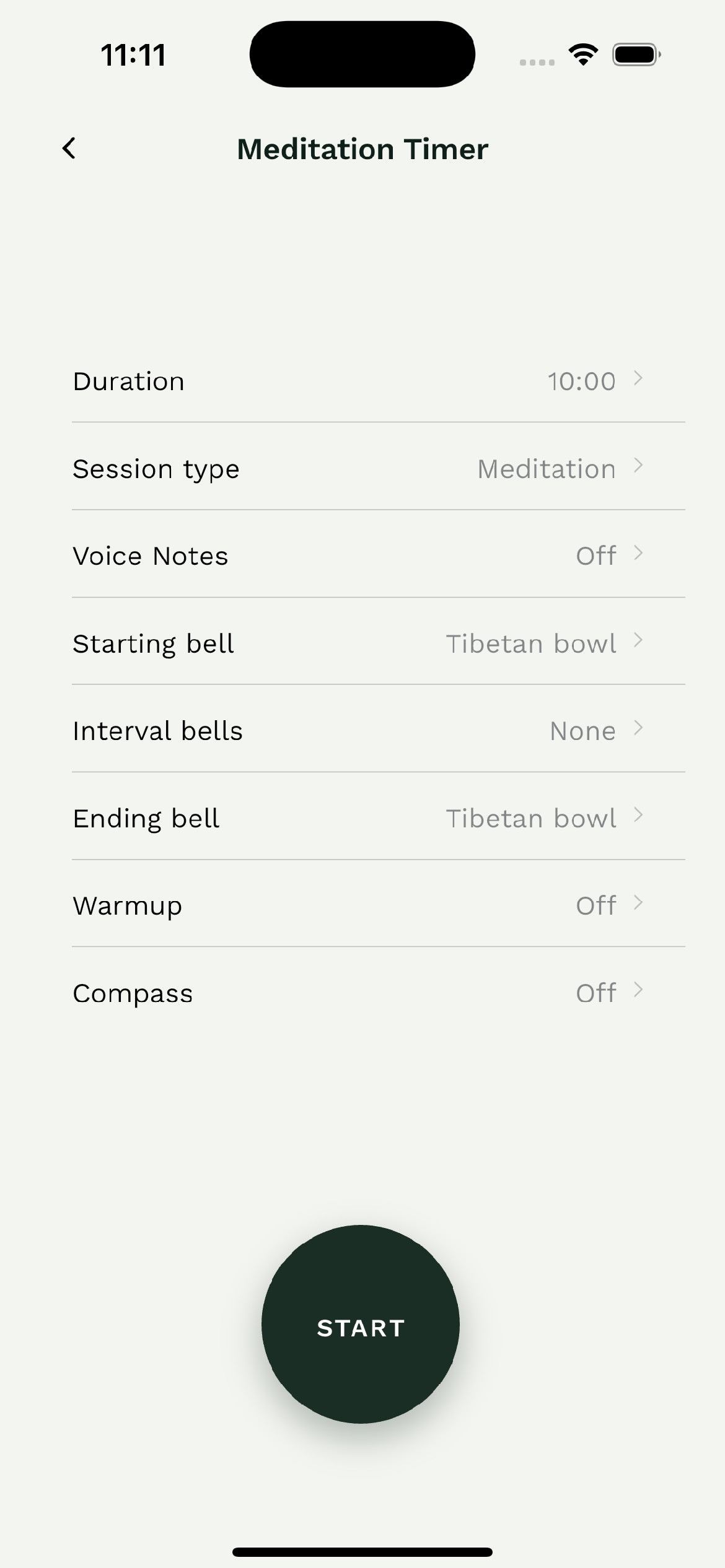

Meditation That Understands Your Exact Pain Condition
Generic 'pain relief' meditations don't work when your fibromyalgia flares at 2am, your arthritis acts up after gardening, or your back pain spikes at your desk. Get AI-guided sessions created for YOUR condition, in YOUR moment.

You've tried 'Body Scan for Pain.' It didn't get it.
'Breathe into your pain' doesn't help when you don't know if it's fibro fog, a flare-up, or just a bad day.
Arthritis in your hands needs different guidance than sciatica down your leg. Generic sessions treat all pain the same.
Apps tell you to 'stretch gently' without knowing your injury history, inflammation levels, or whether moving right now will make it worse.
Your pain isn't generic. Your meditation shouldn't be either.
How AI Guidance Changes by Your Condition
The same moment, five different conditions, five completely different meditation sessions
Fibromyalgia
10M Americans"Scan your body from toes to head"
"Fibromyalgia creates allodynia—normal touch feels painful. We're not going to scan. We're going to acknowledge that your nervous system is sensitive, and that's real. Let's focus on breath, nothing more complex, because fibro fog makes concentration hard."
Chronic Back Pain
75M Americans"Find a comfortable position"
"Your L4-L5 injury means lying flat might worsen it. Let's find a position that supports your spine: knees bent, small pillow under lumbar curve. Deep breathing engages core—let's use chest breathing instead."
Arthritis
58M Americans"Move gently through stretches"
"You spent the day gardening. Your hands are paying for it now—that's the arthritis trade-off. Let's acknowledge you're not going to stop doing what you love, but we can help the aftermath. No hand movements required."
Migraines
40M Americans*Plays chime* "Focus on the sound..."
"Migraine mode: no bells, no chimes, voice at minimum volume. We'll use silence for most of this. Brief guidance, then quiet. Light sensitivity? Keep your eyes closed the entire time."
Neuropathic Pain
10M+ Americans"Breathe into the area"
"Neuropathy isn't tissue damage—it's your nerves misfiring. This isn't something you can 'breathe into.' Instead, let's focus on the parts of your body that DO feel normal right now. Your nervous system needs a break from hypervigilance."
Pre-Recorded Sessions vs. AI-Guided for Your Condition
Why condition-specific guidance makes all the difference
| Feature | StillMind AI-Guided | Other Meditation Apps |
|---|---|---|
| Personalization | Sessions for fibromyalgia, arthritis, back pain, migraines, neuropathy | Generic "pain relief" tracks or body scans |
| Timing Context | Adjusts for 2am fibro flares vs afternoon arthritis stiffness | Ignores time/severity |
| Medical Understanding | "Fibromyalgia creates allodynia—your nervous system is sensitive" | "Breathe into discomfort" or "Accept the pain" |
| Positioning Guidance | L4-L5 injury? Knees bent, pillow under lumbar curve | "Get comfortable" or "Find a restful position" |
| Duration Flexibility | 5 mins during flare, 15 when stable | Fixed durations (10-20 minutes) |
| Validation Language | "You've lived with this 3 years—you have accepted it" | "Just accept it" or "Let go of resistance" |
| Session Creation | AI creates new session each time based on current state | Choose from pre-recorded library (same every time) |
Generic meditation wasn't built for chronic pain. Get guidance that understands your condition.
One Input, Personalized AI-Guided Session
Describe Your Moment
Tell us about your condition, what hurts right now, how bad it is, and how you're feeling. The AI uses this to create a session specifically for you.
AI Creates Your Session
Based on your input, AI generates personalized guidance that understands your specific pain type, severity, and emotional state.
Guided Meditation Begins
Listen to your custom session with positioning advice, breathing techniques, and validation tailored to your exact situation.
Why Condition-Specific Meditation Works
2024 Research Findings
- Mindfulness meditation bypasses opioid receptors, reducing pain through distinct neural pathways (NCCIH, 2024)
- Personalized meditation approaches outperformed generic MBSR for fibromyalgia patients (Frontiers in Integrative Neuroscience, 2022)
- Pain catastrophizing reduced when mindfulness guidance validates specific condition experience (Frontiers in Integrative Neuroscience, 2024)
The Key Difference
Generic meditation treats all pain as the same neurological experience. But fibromyalgia's central sensitization is fundamentally different from arthritis inflammation or nerve damage.
AI guidance can target the specific mechanisms of YOUR pain type.
Condition-Specific Journaling
After your session, journal prompts adapt to your condition. Fibro: 'Did the guidance help with brain fog?' Back pain: 'Did the positioning help? Pain level before/after?' Arthritis: 'Which joints were affected? Flare trigger identified?' Track what actually works for YOUR pain type.

Pattern Tracking That Makes Sense
See which meditation approaches work best for YOUR pain. Time of day patterns. Severity levels that respond best. Guidance styles that resonate. Because chronic pain doesn't follow a schedule—your tracking shouldn't demand one either.

Compassionate Momentum
Track practice without streak pressure. Meditated 4 out of 7 days? That's real consistency with unpredictable pain. Missed a week during a flare? Welcome back, no judgment. Your pain isn't generic. Your progress tracking shouldn't be either.

What People Are Saying About StillMind
Such a calming meditation app
I honestly love this app. It feels so wholesome and easy to use. The design is simple but really modern, and the dark mode makes it extra relaxing...
I honestly love this app. It feels so wholesome and easy to use. The design is simple but really modern, and the dark mode makes it extra relaxing. The onboarding felt super personal and different from other apps, and I'm obsessed with the little details like the gentle vibrations and the closing bell at the end of a session. Being able to customize meditations is great, but I also like that there are quick defaults when I just want to jump right in. The mood tracking and daily progress idea is such a cool touch too. It kind of feels like closing your Apple Fitness rings, but in a mindful way. Plus, I think it's awesome that you can invite friends and share the journey. Overall, it just feels calming, intuitive, and really supportive. Definitely one of the best meditation apps I've tried.
This app actually got me to meditate! And like it!
I have never really had the habit of meditating but this app is so simple and intuitive that it is perfect for my chaotic mind. I love that you can adjust the session length...
I have never really had the habit of meditating but this app is so simple and intuitive that it is perfect for my chaotic mind. I love that you can adjust the session length and pick a meditation session type… for example I love using the Affirmations just so I can meditate, focus and ground myself in an affirmation and intention for the day. The journal entry right afterwards is so perfect for you to jot your thoughts down after a session… I love the font, the font size, I love the tracker to show your progress! This app is actually worth it. I actually look forward to my mornings now for my personal 2-5min moment with myself. There are features I haven't even explored but so far it's a 10/10 for me (and I'm usually very critical of apps!).
Groundbreaking voice recording feature
The feature that lets me record my voice during meditation and automatically transcribes it is truly groundbreaking! For about three years I've struggled with losing most of my intuitive insights...
The feature that lets me record my voice during meditation and automatically transcribes it is truly groundbreaking! For about three years I've struggled with losing most of my intuitive insights by the time I finish meditating — this solves that perfectly. Thank you!
Truly amazing!!
Honestly, this app is amazing. The AI feels super personal and it actually adapts to how I'm feeling, which makes meditating way easier and more natural...
Honestly, this app is amazing. The AI feels super personal and it actually adapts to how I'm feeling, which makes meditating way easier and more natural. The design is clean, the vibe is calming, and it's been helping me stay consistent without forcing it. Definitely my favorite mindfulness app so far!
Personalized meditation that actually works
I thought that a meditation app like this wouldn't work for me, but it does! I love that the speech is personalized to fit my current situation!
I thought that a meditation app like this wouldn't work for me, but it does! I love that the speech is personalized to fit my current situation!
Perfect for beginners
Very user friendly app and a great introduction to meditation for a beginner like me!
Very user friendly app and a great introduction to meditation for a beginner like me!
Guided AI makes meditation easy
A great meditation app, the guided AI makes is really easy to use.
A great meditation app, the guided AI makes is really easy to use.
Easy setup and helpful reminders
Very easy to set up and use, clear instructions and the reminders are so helpful
Very easy to set up and use, clear instructions and the reminders are so helpful
a very nice meditation journal app
I love that it's a combination of meditation and journal! the app experience so far is very pleasant, offers variety of meditation types and its customisable...
I love that it's a combination of meditation and journal! the app experience so far is very pleasant, offers variety of meditation types and its customisable! allows to track accountability. the UI and UX are very nice and app is easy to navigate! would be definitely recommending to my friends! can't wait to see how this app evolves!
I didn't know I needed this
The personalisation of these meditations is amazing. Most meditations I've done in the past have been generic and my mind stays to wander...
The personalisation of these meditations is amazing. Most meditations I've done in the past have been generic and my mind stays to wander, but I can use these guided meditations to keep bringing me back to the core reason why I'm doing it and not getting lost in my own thoughts.
AI guided meditation for the win
StillMind changed the game for me when it comes to meditation, because I can write down my intentions and let the voice guide me. (I am a beginner to meditation)
StillMind changed the game for me when it comes to meditation, because I can write down my intentions and let the voice guide me. (I am a beginner to meditation)
Groundbreaking
I was sceptical about AI generated and guided meditation sessions, but within a few moments that all melted away. Now I am glad I have a tool to achieve calm...
I was sceptical about AI generated and guided meditation sessions, but within a few moments that all melted away. Now I am glad I have a tool to achieve calm that adapts to the situation I find myself in. The app responds well, the voices are calming yet clear. This has just become my daily driver of calm.
Available on iOS and Android
Common Questions About Meditation for Chronic Pain
Why doesn't generic meditation work for fibromyalgia?
Generic meditation often fails for fibromyalgia because it treats all pain the same. Fibromyalgia involves central sensitization—your nervous system amplifies normal signals into pain. Generic 'body scans' can actually increase somatic focus and worsen symptoms. Condition-specific guidance addresses fibro fog, allodynia, and validation needs that generic sessions miss.
What makes meditation effective for chronic pain?
Research shows meditation reduces chronic pain by bypassing opioid receptors and working through distinct neural pathways. However, effectiveness depends on matching the meditation approach to the specific pain type. Personalized meditation approaches outperformed generic MBSR for fibromyalgia patients specifically because they addressed their unique symptoms and condition-specific challenges.
Can AI-guided meditation help chronic back pain?
AI-guided meditation can address chronic back pain more effectively than generic sessions by providing position-specific guidance (like avoiding lumbar strain), distinguishing flare-ups from baseline pain, and adjusting breathing techniques to avoid core engagement that might worsen symptoms. It accounts for injury history and current pain severity in real-time.
Is meditation better than medication for chronic pain?
Meditation is not a replacement for medication but a complementary approach. 2024 research from NCCIH shows meditation reduces chronic pain by bypassing opioid receptors through distinct neural pathways. It works best alongside medical treatment, not instead of it. Always consult your healthcare provider before changing pain management approaches.
How long does meditation take to help chronic pain?
Research shows mindfulness meditation can reduce pain perception within 4-8 weeks of consistent practice. However, condition-specific meditation may provide faster relief because it addresses your specific pain type from day one. Most StillMind users report some benefit within the first 2 weeks, with significant improvements after 30 days of practice.
How is meditation for arthritis different from other pain?
Arthritis meditation needs to account for joint-specific pain, inflammation cycles, weather triggers, and episodic flares. Unlike nerve pain or muscle pain, arthritis often limits range of motion and creates predictable patterns. Effective meditation validates activity trade-offs (like pain after gardening) and doesn't require hand mudras or movements during active inflammation.
What should I look for in a meditation app for chronic pain?
Look for: 1) Condition-specific guidance (not just 'pain relief'), 2) Adjustable session length (flare-ups need shorter options), 3) Positioning guidance for your specific condition, 4) Validation of your experience (not just 'accept the pain'), 5) Sensory considerations (migraines need silence options), and 6) Pattern tracking to see what works for YOUR pain type.
Your Pain Isn't Generic. Your Meditation Shouldn't Be Either.
150+ million Americans live with chronic pain. Most have been told "try meditation"—then given generic body scans that don't understand fibromyalgia, arthritis, back injuries, or migraines.
- AI creates sessions for your specific condition
- Adapts to your moment—not pre-recorded tracks
- Real guidance that knows your reality
Free to start • Private & encrypted • Backed by 2024 chronic pain research
Medical Disclaimer: StillMind provides meditation guidance and is not a substitute for medical treatment. Always consult your healthcare provider for chronic pain management. Our meditation sessions are designed to complement, not replace, professional medical care.
Get Condition-Specific Pain Support
Fibromyalgia. Arthritis. Back pain. Free on iOS & Android.